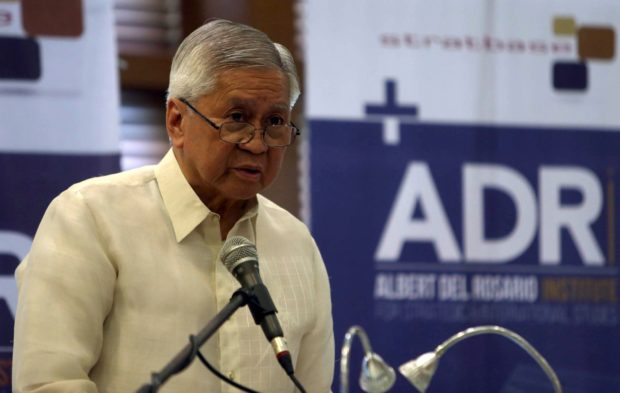Del Rosario: US brokered talks to end 2012 Panatag standoff
MANILA, Philippines — Former Foreign Secretary Albert del Rosario on Tuesday said for the first time that the United States played a key role in the events that led to the Philippines losing control of Panatag (Scarborough) Shoal to China in 2012 and reignited the dispute in the South China Sea.
Del Rosario said the United States brokered talks to end the standoff between China and the Philippines at Panatag and got the two countries to agree to simultaneously pull out their ships from the area.
He admitted that the Philippines mistakenly believed that China would keep its word and call off its ships.
“During the impasse at Scarborough Shoal with China in 2012, we were approached by the US, an honest broker for both China and the Philippines, to agree to a simultaneous withdrawal of ships from the shoal. China had over 30 ships while the Philippines had a total of one ship,” Del Rosario said in a statement.
Beijing’s denial
“We ultimately agreed to the US proposal. At the appointed time, we withdrew, whereas China — acting with duplicity — did not. When confronted with the nonwithdrawal of their ships, Beijing’s response was a denial of the existence of such an agreement,” he said.
The standoff began on April 10, 2012, when two Chinese ships prevented a Philippine Navy ship from arresting eight Chinese vessels found to have harvested endangered corals, giant clams and live sharks from the area.
The Philippines pulled out its two vessels from the shoal on June 15, 2012, expecting the Chinese side to follow suit.
Panelo contradicted
Del Rosario, who led the Philippines’ successful challenge to China’s claim over nearly the entire South China Sea in the Permanent Court of Arbitration in The Hague, contradicted presidential spokesperson Salvador Panelo’s claim and pointed out several instances in the last three years when President Duterte or his press officers had said the ruling would be “shelved.”
He quoted the President’s speech during National Heroes’ Day in August 2016: “I will not use the judgment arbitral now. But I would one day sit in front of your representative or you and then I will lay bare my position. And I would say that, ‘This paper, I cannot get out of the four corners of this document.’ And that is the arbitral judgment.”
From his departure speech on his official visit to Myanmar and Thailand in March 2017, the President said: “I will not invoke the arbitral ruling now. But there will be a time in my term when I will bring the issue back on the table on the four square of the arbitral ruling and it will come.”
Del Rosario chided Panelo for saying that the arbitral ruling “remains unenforceable because no foreign force seems persuaded to help us enforce it.”
“It is mindless as our presidential spokesperson appears to be in surrender without lifting a finger to peacefully defend what is ours,” Del Rosario said.
For comprehensive coverage, in-depth analysis, visit our special page for West Philippine Sea updates. Stay informed with articles, videos, and expert opinions.
